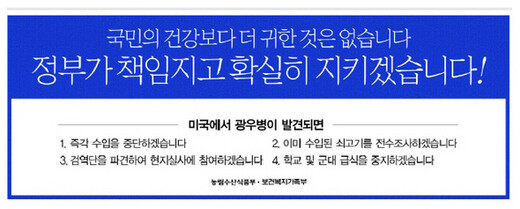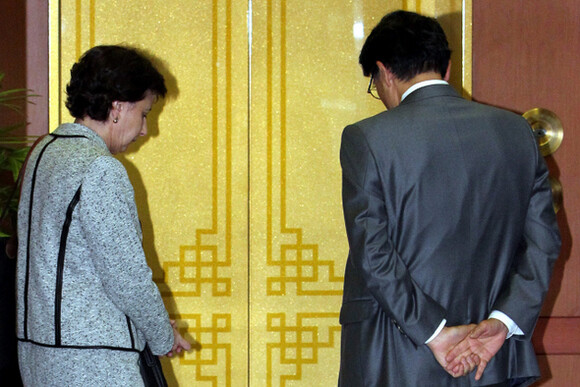hankyoreh
Links to other country sites 다른 나라 사이트 링크
The Korean government lied about beef imports in 2008

By Jung Eun-joo, staff writer
“We seek the United States’ understanding. Please refrain from public rebuttals regarding the Prime Minister’s statement.” Choi Seok-young, diplomatic minister, Embassy of South Korea, USA
“We will not give an official response. It is difficult for the United States to accept the [Korean] government’s notice that it will immediately cease imports if mad cow disease breaks out.” Wendy Cutler, assistant US trade representative
These are extracts from a conversation between former economic minister in the South Korean embassy in Washington DC Choi Seok-young (currently Korea’s chief KORUS FTA negotiator) and assistant US trade representative Cutler after a May 8, 2008 by then-prime minister Han Seung-soo. The conversation is included a classified transcript of diplomatic correspondence obtained by the Hankyoreh on Thursday. The documents from the Korean embassy in Washington dated May 9, 2008, and titled, “Deliberations with the USTR [United States trade representative] regarding the beef issue,” show that Choi explained the domestic situation in which Han had made his statement, before asking for the US side’s understanding and requesting that they refrain from making a public rebuttal to the prime minister’s statement.
Han had stated, “We will adopt measures to cease imports if we judge that mad cow disease outbreaks in the USA pose a danger to public health.” The Ministry for Food, Forestry, Agriculture and Fisheries (MFFAF) and the Ministry of Health & Welfare (MHW), too, issued a joint notice and placed advertisement in daily newspapers, pledging, “We will immediately cease imports if mad cow disease is discovered in the United States.”
Cutler said that she would not give an official response. She merely pointed out that the prerequisites for measures to cease imports were mutually incompatible with the “beef import hygiene conditions” agreed on April 18.
The two states agreed that if mad cow disease broke out in the US, the Korean government would only adopt measures to cease imports if the World Organization for Animal Health (OIE) downgraded the US’s status from Controlled BSE Risk to higher risk, after an internal epidemiological investigation. When popular protests then escalated due to concerns that Korea had given up its “quarantine sovereignty” for the protection of public health, the government issued the statement and notice.
Cutler stated that the US could accept the wording of the prime minister’s statement but that it was hard for it to accept the joint notice by the MIFFAF and the MHW. She hoped, she said, that the US government would make its stance clear. The Korean government thus made clear its position that the Korean government could not take immediate measures even if mad cow disease broke out in the US, and that it must only cease imports if preconditions, such as the establishing of scientific grounds, had been met.

This is why, on Wednesday, Yeo In-hong, head of the MIFFAF’s office of food industry policy, said, “Immediately ceasing quarantine has the potential to lead to friction in trade. Only by adopting measures based on somewhat more scientific grounds can we reduce trial and error.”
The two states subsequently opened renegotiations, but agreed only to add the vague expression, “The Korean government reserves the right to adopt the measures necessary to cease imports in order to protect the health and safety of the Korean public,” to the provisions regarding beef import hygiene conditions. Despite this, on June 22, the Korean government issued a press release titled, “Q&A regarding renegotiations over US beef,” in which it clearly stated, “In the event that further instances of mad cow disease are discovered in the United States, we will begin by adopting measures to cease imports of US beef.” It appears the government went as far as telling a lie that broke its “promise to the people” in order to keep its “promise with the US.”
Three months later, in September 2008, while amending the law on preventing infectious livestock diseases, the government disguisedly reflected the promise it had made to the US. It introduced the “government’s discretionary power” by saying, “If further instances of mad cow disease are discovered in the exporting country, imports may be ceased if emergency measures are required.” An official working with independent lawmaker Choi In-kee, who tabled the amendment to the livestock infectious disease prevention law at the time in his capacity as a Democratic Party lawmaker, said, “The purpose of the bill was effectively to get the government to cease imports immediately, as it had promised. If government departments make judgments like that, in the future we will have no choice but to make all laws rigid, with language like `must‘ included.”
Blue House spokesperson Park Jeong-ha said, “A government advertisement in 2008 lowered the level of the related law through an agreement between the ruling and opposition parties at the National Assembly in September of the same year, and the government did not break its promise because the text of the advertisement was short and some aspects were not sufficiently explained.”
Please direct questions or comments to [english@hani.co.kr]
Editorial・opinion
![[Editorial] Does Yoon think the Korean public is wrong? [Editorial] Does Yoon think the Korean public is wrong?](https://flexible.img.hani.co.kr/flexible/normal/500/300/imgdb/original/2024/0417/8517133419684774.jpg) [Editorial] Does Yoon think the Korean public is wrong?
[Editorial] Does Yoon think the Korean public is wrong?![[Editorial] As it bolsters its alliance with US, Japan must be accountable for past [Editorial] As it bolsters its alliance with US, Japan must be accountable for past](https://flexible.img.hani.co.kr/flexible/normal/500/300/imgdb/original/2024/0417/6817133413968321.jpg) [Editorial] As it bolsters its alliance with US, Japan must be accountable for past
[Editorial] As it bolsters its alliance with US, Japan must be accountable for past- [Guest essay] Amending the Constitution is Yoon’s key to leaving office in public’s good graces
- [Editorial] 10 years on, lessons of Sewol tragedy must never be forgotten
- [Column] A death blow to Korea’s prosecutor politics
- [Correspondent’s column] The US and the end of Japanese pacifism
- [Guest essay] How Korea turned its trainee doctors into monsters
- [Guest essay] As someone who helped forge Seoul-Moscow ties, their status today troubles me
- [Editorial] Koreans sent a loud and clear message to Yoon
- [Column] In Korea’s midterm elections, it’s time for accountability
Most viewed articles
- 1Samsung barricades office as unionized workers strike for better conditions
- 2[Column] The clock is ticking for Korea’s first lady
- 3[Editorial] When the choice is kids or career, Korea will never overcome birth rate woes
- 4Why Israel isn’t hitting Iran with immediate retaliation
- 5[News analysis] After elections, prosecutorial reform will likely make legislative agenda
- 6S. Korea, Japan reaffirm commitment to strengthening trilateral ties with US
- 7Japan officially says compensation of Korean forced laborers isn’t its responsibility
- 8[Editorial] As it bolsters its alliance with US, Japan must be accountable for past
- 9[Editorial] Does Yoon think the Korean public is wrong?
- 10[Guest essay] How Korea turned its trainee doctors into monsters